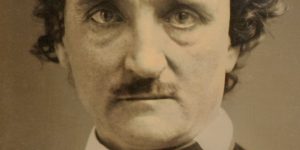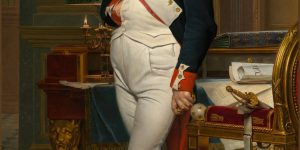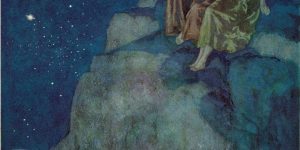STANZAS POEM by Edgar Allan Poe
How often we forget all time, when lone
Admiring Nature’s universal throne;
Her woods—her wilds—her mountains—the intense
Reply of hers to our intelligence!
[Byron, The Island.]
1
In youth have I known one with whom the Earth
In secret communing held—as he with it,
In daylight, and in beauty from his birth:
Whose fervid, flickering torch of life was lit
From the sun and stars, whence he had drawn forth
A passionate light—such for his spirit was fit—
And yet that spirit knew not, in the hour
Of its own fervour—what had o’er it power.
2
Perhaps it may be that my mind is wrought
To a fever by the moonbeam that hangs o’er,
But I will half believe that wild light fraught
With more of sovereignty than ancient lore
Hath ever told—or is it of a thought
The unembodied essence, and no more
That with a quickening spell doth o’er us pass
As dew of the night-time o’er the summer grass?
3
Doth o’er us pass, when, as th’ expanding eye
To the loved object—so the tear to the lid
Will start, which lately slept in apathy?
And yet it need not be—(that object) hid
From us in life—but common—which doth lie
Each hour before us—but then only, bid
With a strange sound, as of a harp-string broken,
To awake us—’Tis a symbol and a token
4
Of what in other worlds shall be—and given
In beauty by our God, to those alone
Who otherwise would fall from life and Heaven
Drawn by their heart’s passion, and that tone,
That high tone of the spirit which hath striven
Tho’ not with Faith—with godliness—whose throne
With desperate energy ‘t hath beaten down;
Wearing its own deep feeling as a crown.
Stanzas (above poem) was printed in Tamerlane and Other Poems in 1827.
In 1845 a similar poem (poem below) with the title Stanzas was published in the Graham’s Magazine in December of 1845 and signed P. It was attributed to Edgar Allan Poe based on a copy owned by Frances Sargent Osgood, on which she had written notes.
In 1845; addressed to Frances Sargent Osgood
In youth have I known one with whom the Earth
In secret communing held- as he with it,
In daylight, and in beauty from his birth:
Whose fervid, flickering torch of life was lit
From the sun and stars, whence he had drawn forth
A passionate light- such for his spirit was fit-
And yet that spirit knew not, in the hour
Of its own fervor what had o’er it power.
Perhaps it may be that my mind is wrought
To a fever by the moonbeam that hangs o’er,
But I will half believe that wild light fraught
With more of sovereignty than ancient lore
Hath ever told- or is it of a thought
The unembodied essence, and no more,
That with a quickening spell doth o’er us pass
As dew of the night-time o’er the summer grass?
Doth o’er us pass, when, as th’ expanding eye
To the loved object- so the tear to the lid
Will start, which lately slept in apathy?
And yet it need not be- (that object) hid
From us in life- but common- which doth lie
Each hour before us- but then only, bid
With a strange sound, as of a harp-string broken,
To awake us- ‘Tis a symbol and a token
Of what in other worlds shall be- and given
In beauty by our God, to those alone
Who otherwise would fall from life and Heaven
Drawn by their heart’s passion, and that tone,
That high tone of the spirit which hath striven,
Tho’ not with Faith- with godliness- whose throne
With desperate energy ‘t hath beaten down;
Wearing its own deep feeling as a crown.





